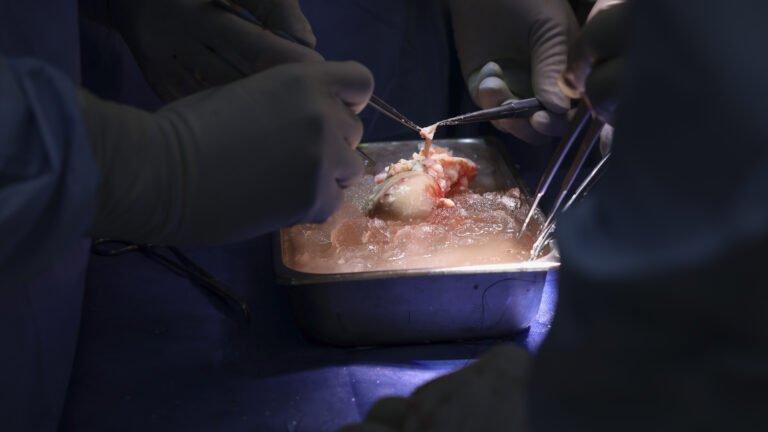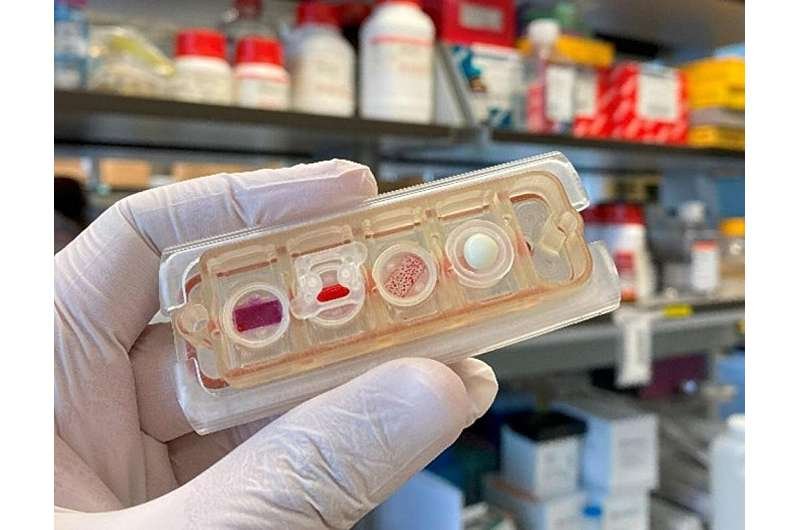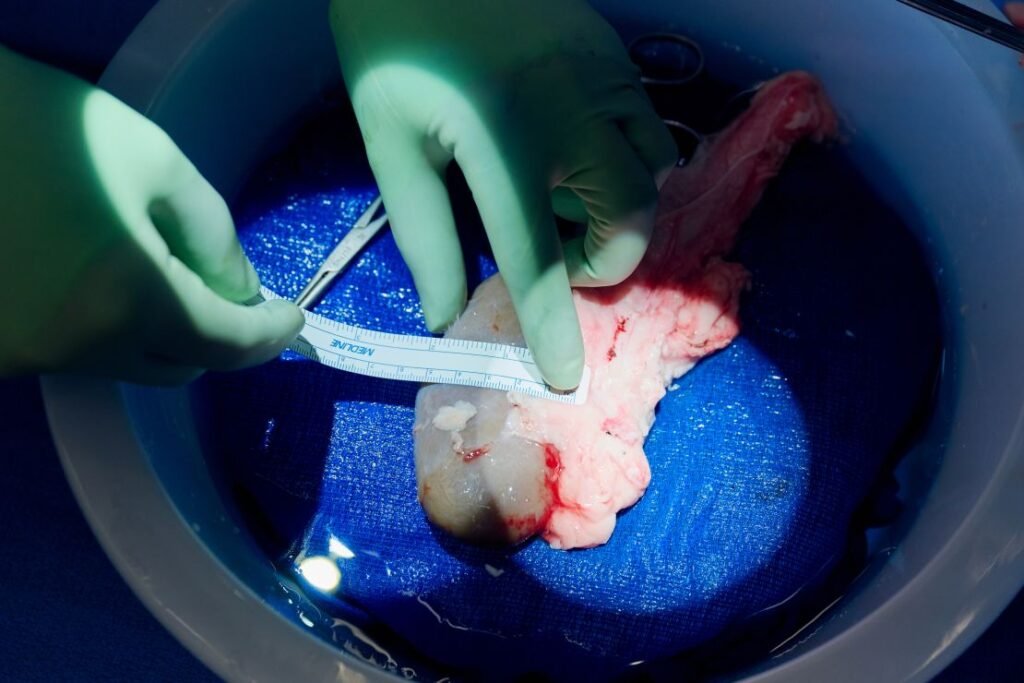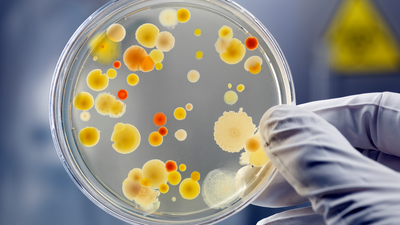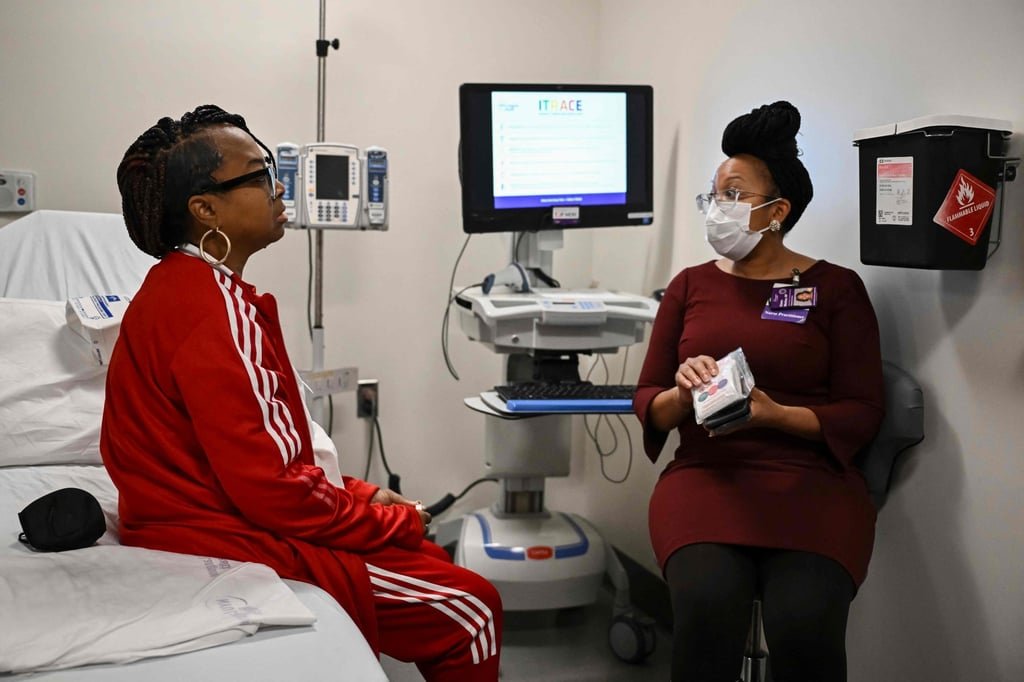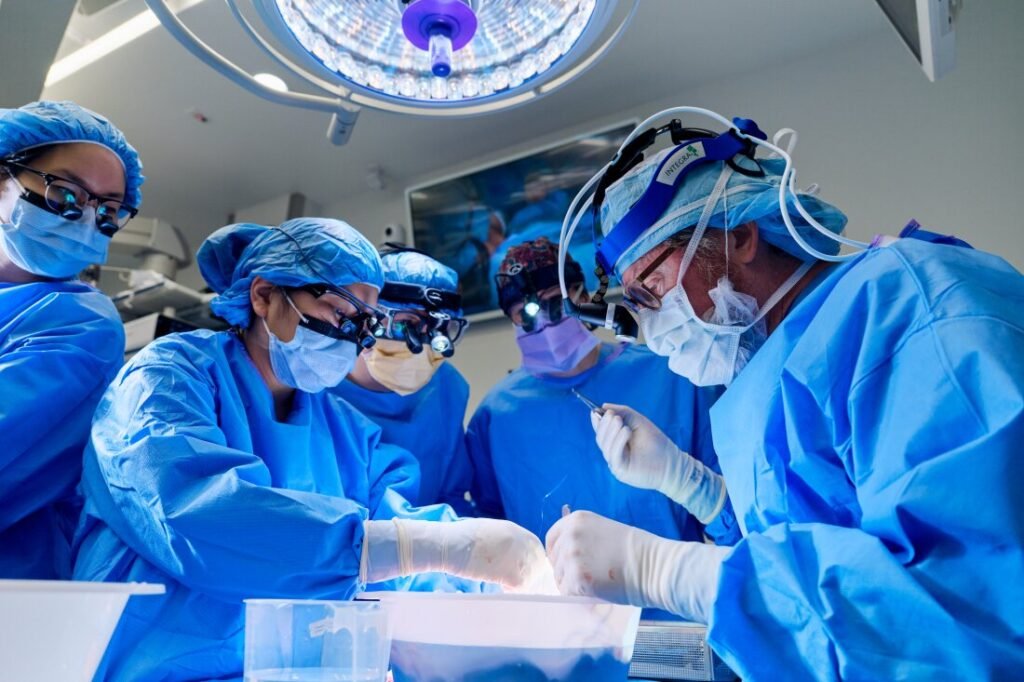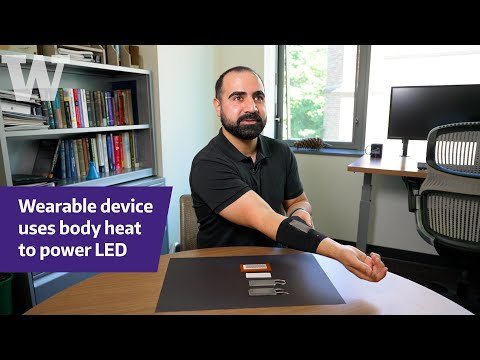An Alabama woman is free from dialysis and in better health after surgeons at NYU Langone Health performed a gene-edited pig kidney transplant last month. The procedure marks the latest promising breakthrough in an emerging surgical practice posited as the solution to the organ supply crisis.
Towana Looney, 53, donated a kidney to her mother in 1999 but developed kidney failure several years later after a complication during pregnancy caused damaging high blood pressure. Less than 1 percent of living donors develop kidney failure, but those who do need a transplant are given higher priority on the waiting list. By December 2016, she needed to start dialysis treatment to remove excess fluid and waste from her blood stream. She was listed for kidney transplantation in early 2017, but it proved nearly impossible to find a suitable match: the unusually high levels of harmful antibodies in her blood made a devastating form of transplant rejection likely. She remained on the transplant waiting list for nearly eight years while slowly losing accessible blood vessels to support dialysis.
Given her worsening medical conditions from prolonged dialysis and the improbability of finding a successful match after years of searching, Looney was authorized to receive a pig kidney with 10 gene edits under the Food and Drug Administration’s expanded access program, otherwise known as compassionate use. The program allows investigational medical products to be used outside of clinical trials when a patient has a life-threatening condition.
Xenotransplantation remains a new frontier in surgery, with challenges to overcome. However, Looney is the healthiest she’s been in eight years. “It’s a blessing,” said Looney. “I feel like I’ve been given another chance at life. I cannot wait to be able to travel again and spend more quality time with my family and grandchildren.”
Looney’s procedure marks the third time that a kidney from a gene-edited pig has been transplanted into a living human. She is the first to receive a kidney from a pig with 10 gene edits and is currently the only person in the world living with a pig organ.
“We must at all costs protect our heroes who themselves have given the gift of life to someone else,” said Robert Montgomery, MD, DPhil, who led the procedure and who is the H. Leon Pachter, MD, Professor of Surgery; chair of the NYU Grossman School of Medicine Department of Surgery; and director of the NYU Langone Transplant Institute. “Towana represents the culmination of progress we have made in xenotransplantation since we performed the first surgery in 2021. She serves as a beacon of hope to those struggling with kidney failure. All the physicians, researchers, nurses, administrators, and perioperative care teams at NYU Langone Health involved in making this moment possible are so thrilled for her, and I couldn’t be more proud of what they have done to improve Towana’s life through this incredible scientific achievement.”
Towana Looney is in better health after receiving a gene-edited pig kidney transplant at NYU Langone Health, marking a significant breakthrough in addressing the organ supply crisis. Looney, who had been on dialysis for nearly eight years due to kidney failure, was authorized to receive the pig kidney under the FDA’s compassionate use program.
At home in Alabama, Looney was originally under the care of Jayme Locke, MD, MPH, a transplant surgeon who led innovations in xenotransplantation while at the University of Alabama at Birmingham (UAB). Dr. Locke initiated Looney’s FDA expanded access application to receive a kidney from a pig with 10 gene edits. At UAB, Dr. Locke conducted several studies to verify the organ performed the same life-sustaining functions as a human kidney, and as a result, was able to provide critical data to the FDA for approval of the emergency application.
Dr. Jayme Locke, Towana Looney, and Dr. Robert Montgomery
Credit: Mateo Salcedo/NYU Langone Health
Dr. Locke partnered with Dr. Montgomery, her long-time mentor, to help make a xenotransplant possible for Looney. Additionally, Dr. Locke was recently appointed to a new transplant leadership position as director of the Division of Transplantation at the U.S. Health Resources and Services Administration.
Nearly 104,000 people are on the waiting list for a transplant, with over 90,400 of those waiting for a kidney. According to the Centers for Disease Prevention and Control, more than 1 in 7 adults—about 35.5 million people—have chronic kidney disease in the United States. Of those, the National Institutes of Health estimates nearly 808,000 have end-stage kidney disease, but only about 27,000 received kidney transplants in 2023.
Multimedia Materials Available
Multimedia materials, including photos and a B-roll video package, are available for download.
About the Procedure
Looney’s surgery is the latest in a series of similar procedures known as xenotransplantation, which is the practice of transplanting organs between species.
The kidney was transplanted into Looney’s lower abdomen after a seven-hour surgery co-led by Dr. Montgomery and Dr. Locke on November 25, 2024, at NYU Langone Health in New York City. The organ, known as a UKidney, was from a gene-edited pig developed by Revivicor Inc., a subsidiary of United Therapeutics Corporation. The 10 gene edits include removal of three immunogenic antigens (Gal, Sda, and Neu5Gc) and a porcine growth hormone receptor. Six human transgenes were added to make the gene-edited pig kidney more compatible with the human recipient and reduce the likelihood of rejection. The gene edits, pig breeding, and production of the investigational UKidney used in this procedure were performed by United Therapeutics and Revivicor. No other unapproved devices or medications were used in the procedure.
After 11 days of postsurgical observation by the NYU Langone Transplant Institute team, Looney was discharged from the hospital on December 6 to an apartment in New York City. She will visit the hospital daily for evaluation. As part of her acute antibody sensitivity treatment, she may periodically undergo inpatient administration of medicine while her immune system adapts to her new organ. She is expected to return home to Alabama in three months.
“Towana is an inspiration. Her journey toward achieving a life-sustaining kidney transplant has been long and filled with countless obstacles, yet she did not waver. To see hope restored for a future that for so long had been out of reach for her and her family and community is nothing short of miraculous,” said Dr. Locke. “Transplant is one of the few therapies that can cure a complex disease overnight, yet there are too few organs to provide a cure for all in need. NYU Langone Health sets excellence as the standard, and their commitment to innovation is palpable, as evidenced by Towana—the only living person with a functioning xenograft. Being a member of her care team was an absolute privilege, and I could not be more proud of the NYU Langone Health team. The thought that we may now have a solution to the organ shortage crisis for others who have languished on our waiting lists invokes the most welcome of feelings: pure joy!”
Additional investigators in the xenotransplant included Adam Griesemer, MD; Jeffrey M. Stern, MD; Bonnie E. Lonze, MD, PhD; Nicole M. Ali, MD; Sapna Mehta, MD; Vasishta Tatapudi, MD; Aprajita Mattoo, MD; Edward Y. Skolnik, MD; Massimo Mangiola, PhD; Philip M. Sommer, MD; Fainareti Zervou, MD; Henry J. Neumann, MD; Anoma Nellore, MD; Elaina P. Weldon, MSN, NP; Karen Khalil, PharmD; Jacqueline Kim, MD; Ian S. Jaffe; Imad Aljabban, MD; Tal Eitan, MD; Rebecca Esker, PharmD; Nikki Lawson, RN; Cecilia Deterville, MS; Jef D. Boeke, PhD; Brendan Keating, DPhil; Simon Williams, PhD; Ming Wu, MD; Ramin Herati, MD; Harvey Pass, MD; Vineeta Kumar, MD; Megan Sykes, MD, director of the Columbia Center for Translational Immunology, and Alexandre Loupy, MD, PhD, director of the Paris Institute for Transplant and Organ Regeneration.
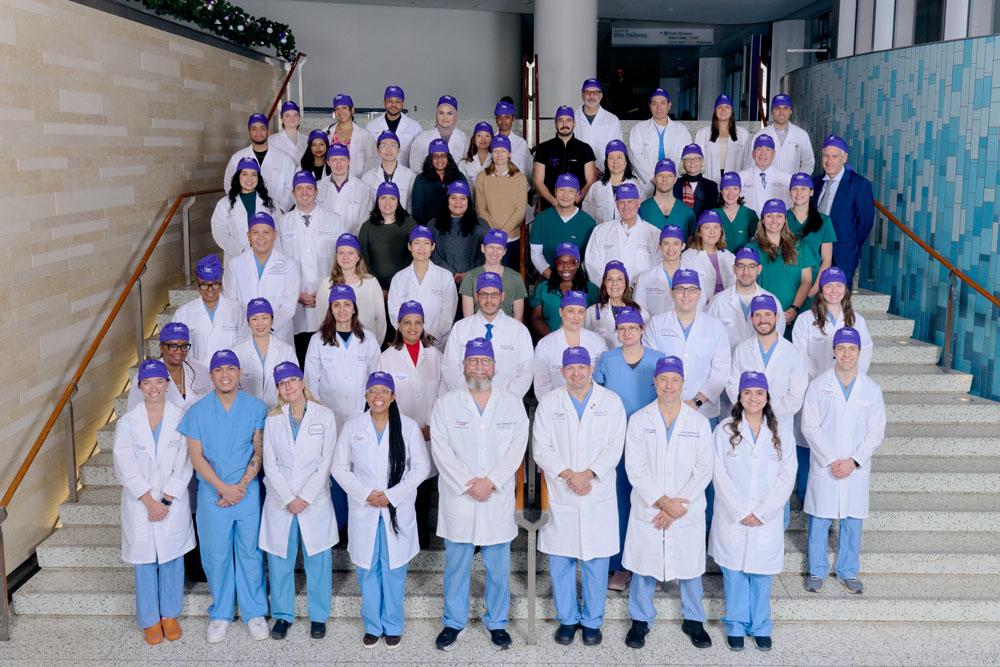
Members of the NYU Langone Transplant Institute’s xenotransplantation team
Credit: Joe Carrotta
NYU Langone Health acknowledges United Therapeutics for the UKidney and financial support provided for xenotransplantation research initiatives, as well as the support of Alexion Pharmaceuticals Inc., which provided Ultomiris, also known as ravulizumab-cwvz, to help prevent kidney rejection. Ultomiris, approved for the treatment of certain rare diseases, was made available for use in this experimental procedure through a collaborative research agreement and compassionate use exception approved by the FDA. As part of Apellis Pharmaceuticals’ compassionate use program, the company provided Empaveli, also known as pegcetacoplan, for off-label treatment to prevent rejection of the organ.
Progress in Xenotransplantation
This complex intervention marks the seventh human xenotransplant surgery performed by the NYU Langone Transplant Institute and orchestrated by Dr. Montgomery, who has spent much of his career studying innovative approaches to expanding the organ supply. He performed the world’s first gene-edited pig-to-human organ transplant on September 25, 2021, in a neurologically deceased person with a beating heart. A similar procedure was conducted on November 22, 2021.
Surgeons at NYU Langone then performed two 10 gene-edited pig heart transplants in summer 2022 in neurologically deceased persons. Last year, a 61-day study of a gene-edited pig kidney xenotransplant in a recently deceased man showed optimal performance with standard-of-care immunosuppression. In April 2024, Lisa Pisano received the first-ever combined heart pump implantation and gene-edited pig kidney transplant. She later died under hospice care on July 7 after difficulty weaning her off in-patient medications used to maintain a high enough blood pressure to support the xenokidney.
“Without the generosity and altruism of those who participated in our research up to this point, this next step in xenotransplantation would not have been possible,” said Dr. Montgomery. “Towana’s case is a precursor to potential clinical trials, under the FDA’s guidance, to determine if these organs are safe as a new, sustainable source of organs for those who needs them.”
About the NYU Langone Transplant Institute
The NYU Langone Transplant Institute offers the highest-quality kidney and lung transplantation programs in the nation, according to federal quality data, while the heart and liver transplant programs stand out in national survival rates and in their success getting patients off the waitlist faster. The institute performs over 600 organ transplants on average each year. NYU Langone’s heart, kidney, liver, lung, and pancreas transplant programs are approved by the Centers for Medicare & Medicaid Services (CMS), which means they have met the stringent volume, process, quality, and survival outcome requirements of CMS regulation.
About NYU Langone Health
NYU Langone Health is a world-class, patient-centered, integrated academic medical center, with a culture rooted in excellence in patient care, education, and research. Vizient Inc. has ranked NYU Langone the No. 1 comprehensive academic medical center in the country for three years in a row, and U.S. News & World Report recently placed nine of its clinical specialties among the top five in the nation. NYU Langone offers a comprehensive range of medical services across 6 inpatient locations, its Perlmutter Cancer Center, and more than 300 outpatient locations across the New York area and Florida. With $14.2 billion in revenue this year, the system also includes two medical schools, in Manhattan and on Long Island, and a vast research enterprise.
Media Inquiries
Colin DeVries
Phone: 212-404-3588
Colin.DeVries@NYULangone.org

